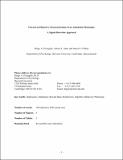| dc.contributor.author | Pizzagalli, Diego | |
| dc.contributor.author | Jahn, Allison L. | |
| dc.contributor.author | O'Shea, James P. | |
| dc.date.accessioned | 2009-07-30T20:46:34Z | |
| dc.date.issued | 2005 | |
| dc.identifier.citation | Pizzagalli, Diego A., Allison L. Jahn, and James P. O'Shea. 2005. Toward an objective characterization of an anhedonic phenotype: a signal detection approach. Biological Psychiatry 57 (4):319-327. | en |
| dc.identifier.issn | 0006-3223 | en |
| dc.identifier.uri | http://nrs.harvard.edu/urn-3:HUL.InstRepos:3202524 | |
| dc.description.abstract | Background: Difficulties in defining and characterizing phenotypes has hindered progress in psychiatric genetics and clinical neuroscience. Decreased approach-related behavior and anhedonia (lack of responsiveness to pleasure) are considered cardinal features of depression, but few studies have used laboratory-based measures to objectively characterize these constructs. Methods: To assess hedonic capacity in relation to depressive, particularly anhedonic, symptoms, 62 participants completed a signal-detection task based on a differential reinforcement schedule. Anhedonia was operationalized as decreased reward responsiveness. Results: Unequal frequency of reward between two correct responses produced a response bias (i.e., a systematic preference to identify the stimulus paired with the more frequent reward). Subjects with elevated depressive symptoms (Beck Depression Inventory scores ≥ 16) failed to show a response bias. Impaired reward responsiveness predicted higher anhedonic symptoms 1 month later, after controlling for general negative affectivity. Conclusions: Impaired tendency to modulate behavior as a function of prior reinforcement might underline diminished hedonic capacity in depression. When applied to a clinical population, objective assessments of participants’ propensity to modulate behavior as a function of reward might provide a powerful tool for improving the phenotypic definition of depression and thus offer a reliable behavioral screening approach for neuroscience studies of depression. | en |
| dc.description.sponsorship | Psychology | en |
| dc.language.iso | en_US | en |
| dc.publisher | Elsevier | en |
| dc.relation.isversionof | http://dx.doi.org/10.1016/j.biopsych.2004.11.026 | en |
| dc.relation.hasversion | http://www.pubmedcentral.nih.gov/articlerender.fcgi?artid=2447922 | en |
| dash.license | LAA | |
| dc.subject | phenotype | en |
| dc.subject | appetitive behavior | en |
| dc.subject | reinforcers | en |
| dc.subject | reward bias | en |
| dc.subject | anhedonia | en |
| dc.subject | depression | en |
| dc.title | Toward an Objective Characterization of an Anhedonic Phenotype: A Signal-Detection Approach | en |
| dc.relation.journal | Biological Psychiatry | en |
| dash.depositing.author | Pizzagalli, Diego | |
| dc.identifier.doi | 10.1016/j.biopsych.2004.11.026 | * |
| dash.contributor.affiliated | Pizzagalli, Diego | |


